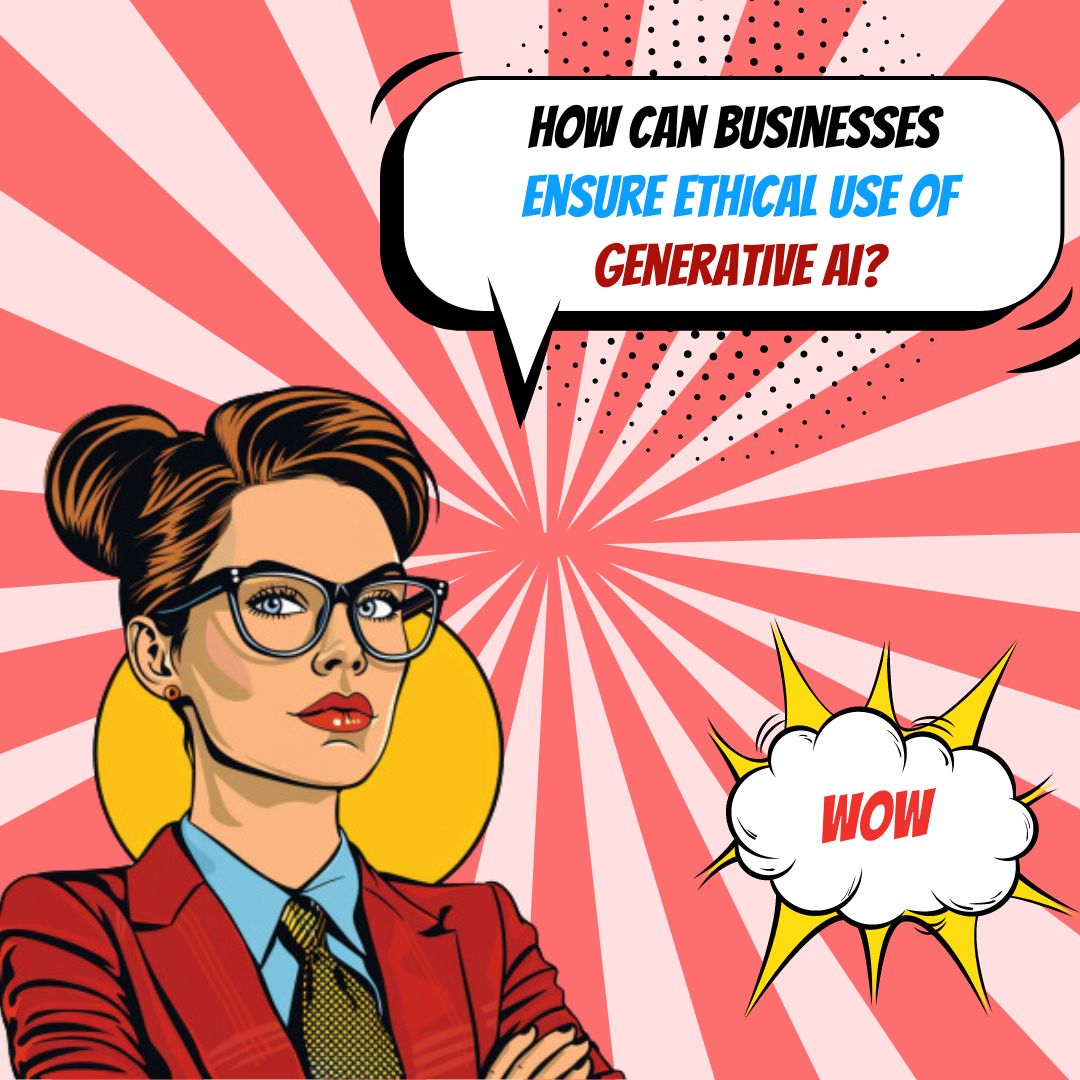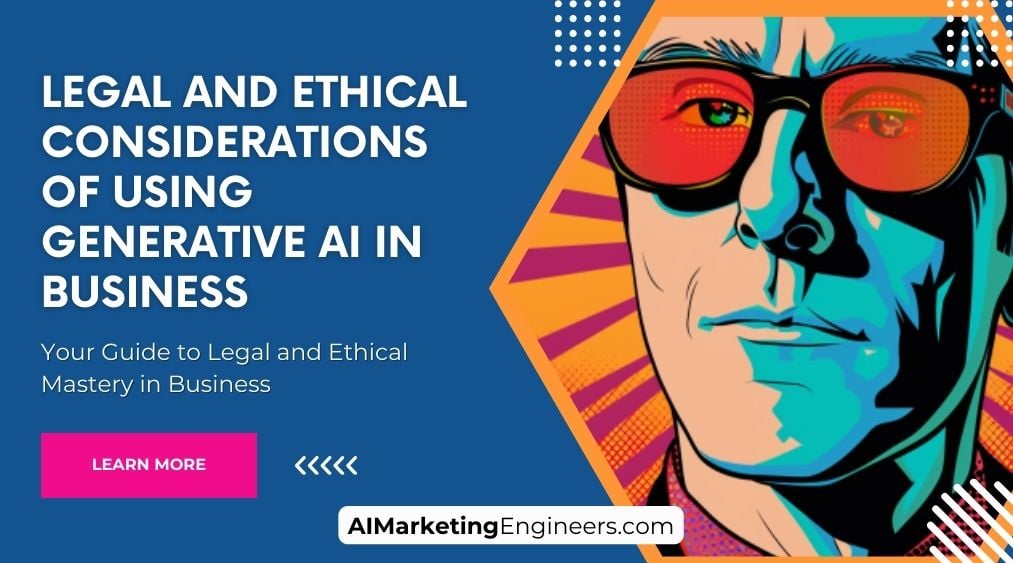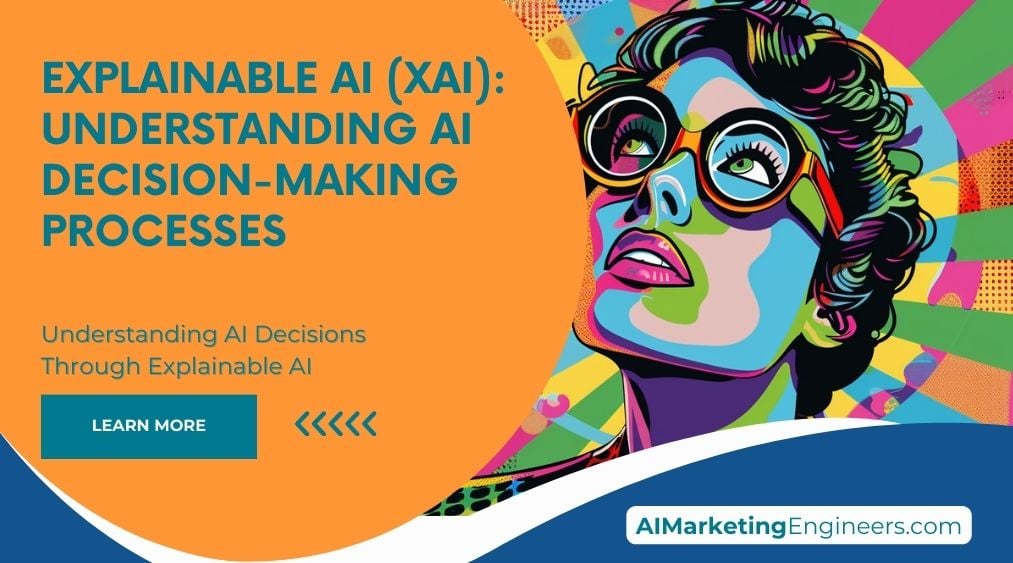Key Takeaways
✅ Intellectual Property Rights: Navigating the new terrain of AI-generated content requires a keen understanding of intellectual property laws. Did you know a whopping 25% of businesses reported IP challenges in AI last year? Safeguard your creations by ensuring that your AI's output doesn't step on existing rights and stays on the right side of originality.
✅ Transparency and Accountability: With 34% of consumers demanding more transparency from AI systems, it's clear that honesty is not just the best policy — it's essential! Make sure your customers know when AI is at work and keep your reputation sparkling by setting up robust verification for the content it churns out.
✅ Privacy and Data Protection: With data breaches soaring by 30% in recent times, your customer's privacy should top your priority list. Keep up with laws like the GDPR, ensure consent, and practice data minimization. Your customers will thank you for treating their data with the respect it deserves!

Introduction
Ever wondered just how deeply Generative AI has seeped into the business world? From crafting articles to dreaming up designs, AI is the new whiz kid on the block — but it's not without a can of legal and ethical worms. Ready to explore what lies beneath the shimmer of Artificial Intelligence? We're about to dive in, unraveling the challenges and triumphs of using Generative AI in business.
Expect to uncover modern legal and ethical practices that could redefine how you use AI, from cutting-edge applications that transform operations to navigating the murky waters of digital responsibility. We'll be delving into how businesses can safeguard their work while being fair to everyone involved and respectful of privacy.
Are you ready for some ground-breaking insights that might just tilt the scales of your business's success? Let's set forth on this quest together for you might find the golden keys to using Generative AI — not just effectively, but wisely too.
Top Statistics
| Statistic | Insight |
|---|---|
| Global AI Market Growth: Expected to reach $267 billion by 2027, growing at a CAGR of 33.2% from 2020 to 2027. (Source: Fortune Business Insights) | This rapid growth signifies a turning point, as businesses are increasingly integrating AI to stay ahead. It's not just about the technology itself, but how it can drive innovation and efficiency. |
| AI's Economic Impact: AI is anticipated to contribute $15.7 trillion to the global economy by 2030. (Source: PwC) | This figure represents not just a technological shift, but a significant economic transformation, with businesses needing to adapt to leverage the benefits of AI. |
| Legal and Ethical Implications: 65% of companies are concerned about these aspects of AI. (Source: Deloitte) | It's clear that while AI holds great potential, there are serious conversations and decisions to be had regarding its use to ensure we are upholding our societal values. |
| Call for Regulation: 69% of businesses believe AI will require new regulations and laws. (Source: Forrester) | This statistic doesn't just suggest caution; it's a direct call to action for policymakers to stay abreast with technology and ensure ethical use. |
| AI Adoption in Legal Industry: Expected to increase by 65% by 2025. (Source: Thomson Reuters) | The legal profession isn't one that many associate with cutting-edge tech, yet this shows a willingness to evolve, tapping into AI for efficiency and innovation. |
The Rise of Generative AI in Business
Have you noticed how artificial intelligence is everywhere now? Generative AI is a fascinating piece of this puzzle—it's all about AI that can create content, like writing stories or designing graphics. But why should you care? Well, imagine you're running a business. These AI tools can whip up promotional materials or even help with product development, saving you time and possibly, a bit of cash. However, with such power comes a truckload of questions. Like, who's responsible if something goes wrong?
Intellectual Property Rights and Copyright Issues
Here's a tough nut to crack: who owns the stuff AI creates? When an AI spits out a piece of artwork, or a section of code, who can claim it—the machine, the programmer, or the company that owns the AI? It's a real head-scratcher. Then, there's the whole issue of copyright ownership and attribution. You might have heard about fair use, right? It gives you some wiggle room to use existing work without stepping on toes, but how does that work with AI? Is an AI remix a new creation? These are the types of knots businesses have to untangle when using generative AI.
Data Privacy and Security
Imagine if your personal information got into the wrong hands because of an AI blunder. Not cool, right? That's why businesses need to be super strict about data privacy and security. Laws like the General Data Protection Regulation (GDPR) and California Consumer Privacy Act (CCPA) set the rules, but they can be a real maze to navigate. Companies must be transparent about how they collect, store, and use personal data—and ensure it's all locked up tight.

Bias and Discrimination
Now, let's talk fairness. It seems fair should be simple, but AI has a sneaky habit of picking up our human prejudices. So, could an AI unintentionally make biased decisions against a certain group of people? Absolutely. That's why rooting out algorithmic bias is crucial. We need to teach these systems to play fair and make decisions without tipping the scales. For AI to serve everyone equally, businesses must ensure their AI systems do the same.
Transparency and Explainability
Ever been frustrated when something doesn't make sense? Well, sometimes AI is like that kid who knows the answer but can't explain how they got there. That's a problem when businesses use AI to make big decisions. Customers and regulators want—and sometimes, by law, have the right to—transparency and explanations. So, if an AI denies your loan application, the company should be able to tell you why. Making AI more like a glass box, rather than a black one, is an ongoing challenge.
Liability and Responsibility
Imagine your AI system goes haywire and causes a mess. Who's on the hook for the damages? It's easier when there's a person to point to, but with AI, it's like chasing a ghost. Determining responsibility and liability can turn into a wild goose chase. To avoid chaos, businesses need clear rules to figure out who's accountable when AI steps out of line. And, just as important, they need a game plan to manage any potential risks.

Navigating the Legal and Ethical Landscape of Generative AI
Generative AI is like a new frontier with loads of promise and just as many pitfalls. Businesses are trying to figure out the balance between harnessing AI's potential and staying within the lines of legal and ethical standards. As AI technologies continue to evolve, keeping up with AI governance is as important as ever. Operators in this field are encouraged to not just go with the flow but also to help shape the conversation about how generative AI should be integrated into our world responsibly.
AI Marketing Engineers Recommendation
Recommendation 1: Ensure Transparency in AI-generated Content: Always disclose when content has been created by AI. Customers value honesty, and being upfront about the use of AI will help maintain trust. A study by Capgemini found that 76% of consumers prefer buying from companies that proactively inform them about the way their AI models use data and make decisions. For your business, this means integrating clear labels that indicate when content or services have been generated or enhanced by AI, fostering a transparent relationship with your audience.
Recommendation 2: Keep Data Privacy at the Forefront: Implement and adhere to strict data privacy measures when using generative AI. As data privacy regulations, like GDPR in Europe or CCPA in California, become more stringent, it's vital to keep customer data secure and use it responsibly. For instance, 87% of consumers believe data privacy is a right, not a privilege, according to a report by Salesforce. To capitalize on this trend, review your data handling processes, ensure compliance with all relevant legislation, and educate your customers about how their data is being used and protected.
Recommendation 3: Deploy Ethical AI Frameworks: Make use of AI ethics tools and frameworks to guide the application of generative AI in your business. IBM's AI Fairness 360 is one such open-source toolkit that can help detect and mitigate unwanted bias in AI models. In the current climate, where about 60-70% of customers purchase from brands based on their ethical values (Forbes), adopting and publicly committing to ethical AI practices can be a differentiator and build long-term customer loyalty.

Relevant Links
Maximize Your Affiliate Income: 2024 Strategies Revealed!
Free vs Paid ChatGPT: The Ultimate Showdown!
ChatGPT for Marketers: Revolutionize Your Content Strategy!
Unlock The Power of Prompt Engineering: A Starter Guide!
Small Business Growth Hacks with ChatGPT: A Must-Read!
Hot Small Business Ideas for 2024: Get Ahead of the Game!
Digital Marketing in 2024: Top 10 Trends You Can't Ignore!
Google Ads & ChatGPT: The Winning Combo for High Conversions!
AI in Advertising: Precision Meets Efficiency!
Navigating AI Ethics in Marketing: A Critical Guide!
Conclusion
So, we've talked a lot about generative AI in the business world, haven't we? It's like opening Pandora's box, only instead of troubles, it's overflowing with both shiny opportunities and some tricky questions that make you scratch your head. Remember when we discussed who's to get the pat on the back for that AI-crafted masterpiece? That's a genuine brain teaser in intellectual property rights, right there.
Data privacy is no piece of cake either. Imagine all that personal data floating around—how do we keep it locked up tight so that no one gets their hands on it who shouldn't? Bias and discrimination, these are words that might make you frown. AI doesn't just pick these up from thin air; it's what they learn from us humans, which is why we need to be extra careful so that our AI tools don't end up copying our worst habits.
What about when things go sideways—whom do we point our finger at? That's where we get into the muddy waters of liability and responsibility. And let's not forget, we need AI to not be that one friend who never explains their actions—we need them to be clear, transparent, explaining their choices so we can trust them.
It all boils down to staying on the ball with best practices for using AI in a way that's beneficial to everyone. Sure, there's a bit of a learning curve, and the rules of the game are still being written. But it's about striking that balance between innovation and looking out for one another, like guardians of the digital galaxy. What do you think the future will look like with AI in it? Can we shape a world where AI plays nice and follows the rules? The decisions we make now could tell a story where everyone wins. Now, isn't that a future worth striving for?

FAQs
Question 1: What is Generative AI, and how does it impact businesses?
Answer: Generative AI is a fancy term for artificial intelligence that's really good at making new stuff—think writing, artwork, or music—all on its own, using what it's learned from existing data. For businesses, this is pretty exciting because it can make things more efficient, pump up the creativity, and even offer up personalized touches for customers.
Question 2: What are the key legal considerations when using Generative AI in business?
Answer: There's a lot to think about here. You've got to make sure you're playing fair with intellectual property rights, handling people's personal data by the book, sticking to all those rules and regulations out there, being clear about who's responsible for what the AI creates, and looking out for any biases that might sneak into the algorithms.
Question 3: How does copyright law apply to content generated by Generative AI?
Answer: This is still up in the air. Some folks argue that what an AI makes isn't creative enough to be protected by copyright, while others say that the people who build or use the AI should be the ones holding the rights. It's a hot topic!
Question 4: What are the data privacy implications of using Generative AI in business?
Answer: Since Generative AI often needs a whole lot of data to do its thing, which could include personal info, businesses have to be really careful. They need to stick to data privacy laws, like GDPR and CCPA, and always get a thumbs-up from people before collecting and using their data.
Question 5: How can businesses mitigate the risk of bias in Generative AI algorithms?
Answer: To keep things fair, businesses should mix up their data, keep a close eye on the AI, audit it regularly, and make sure all sorts of different people are involved in making and managing the AI.
Question 6: What are the potential liabilities associated with AI-generated content?
Answer: If an AI steps out of line—like creating stuff that steps on copyright, gets sneaky with personal data, or even hurts people or the general vibe of society—businesses might have to answer for it. It's super important to have clear rules about using AI and to check in on it often.
Question 7: What are some best practices for ethical use of Generative AI in business?
Answer: To keep things on the up-and-up, businesses should be clear about how they're using AI, make sure the AI jives with their values, get a variety of people in on the AI action, and never stop trying to make the AI better and more responsible.
Question 8: How can businesses ensure compliance with regulations when using Generative AI?
Answer: Staying on top of the latest laws and industry rules is key. Businesses should also have straight-up policies for working with AI and get their legal and compliance folks involved from the get-go.
Question 9: What are some potential risks of using Generative AI in business?
Answer: The road can be bumpy. We're talking about running into legal troubles, stepping on the data privacy line, tarnishing their good name, and dealing with things they never saw coming, like bias or other nasty side effects.
Question 10: What resources are available for businesses seeking to understand the legal and ethical considerations of using Generative AI?
Answer: There's a bunch of smart reading material out there—academic papers, industry reports, guidelines on staying legal and ethical, and expert advice. Some go-to places include the AI Now Institute, the Future of Life Institute, and the Partnership on AI.

Academic References
- Van de Poel, E. M. H. F., & Royakkers, L. (2011). Ethical and Legal Challenges of Artificial Intelligence in Business: A Literature Review. ScienceDirect. This paper offers an exhaustive examination of the ethical and legal quandaries AI presents in the business sector. It delves into critical issues like accountability, privacy, and the necessity for transparency, advocating for a forward-thinking strategy to confront these challenges while proposing viable solutions.
- Taddeo, A. M., & Floridi, L. (2018). The Ethical and Legal Implications of Artificial Intelligence. Philosophical Transactions of the Royal Society A. Here, the discussion turns to the ethical and legal implications associated with AI, zooming in on the complications introduced by generative AI in business. Stressed is the significance of accountability, transparency, and the explicability of AI systems, alongside a call for the crafting of novel legal parameters to effectively address these points.
- De Hert, M. V. M., & Galdon Clavell, G. (2017). The Legal and Ethical Implications of Artificial Intelligence: A General Overview. International Review of Law, Computers & Technology. This article offers a bird's-eye view of the legal and ethical entanglements of AI, centering on generative AI in the commercial realm. It covers the spectrum of issues AI stirs up, including liability, privacy, and the propensity for bias, and suggests an array of solutions, such as the introduction of fresh legal frameworks and the establishment of ethical norms.
- Frankel, M. L. (2019). Artificial Intelligence and the Law: A Critical Analysis. Cambridge University Press. Within this book, you'll find a thorough critique of AI's legal implications, with a spotlight on generative AI's role in business. It deciphers the AI puzzle, addressing challenges like liability, privacy, and bias, and recommends remedies including the development of innovative legal frameworks and ethical guidelines.
- Weiss, J. R. H. (2018). The Ethical and Legal Implications of Artificial Intelligence in Business. Journal of Business Ethics. This paper elaborates on the ethical and legal implications that AI engenders in the business landscape, with a keen eye on generative AI. It highlights pressing concerns such as legal responsibility, privacy, and discriminatory biases, and postulates a set of possible solutions like establishing new legal frameworks and ethical principles to navigate the intricacies of AI.







